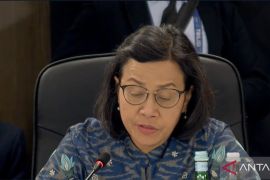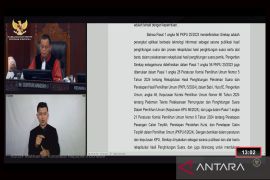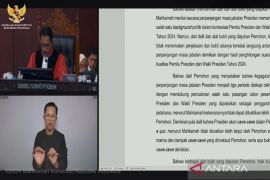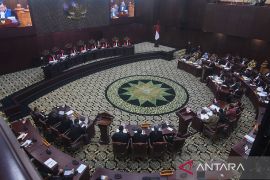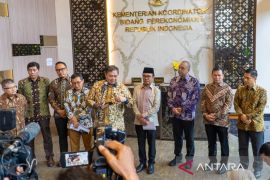"This body will restore the peat ecosystem on a self-reliant basis, meaning that no ministers would be permitted to intervene," Environment and Forestry Minister Siti Nurbaya said.Jakarta (ANTARA News) - Indonesia is seeking to set up a Peatland Ecosystem Restoration Body after the peatlands in Sumatra and Kalimantan suffered extensive damage due to massive fires.
The fires, coupled with this years El Nino-induced drought, have become a cause of major concern.
At a meeting presided over by Vice President Jusuf Kalla on Tuesday (Nov 24)), the government discussed preparations for the creation of such a body. Several ministers, including Environment and Forestry Minister Siti Nurbaya Bakar and Law and Human Rights Minister Yasonna Laoly, were present.
The body will comprise representatives from the Environment and Forestry Ministry, the Public Works and Housing Ministry, the Agriculture Ministry, the National Development Planning Agency and the Geospatial Information Body.
Minister Siti Nurbaya told the press following the meeting that the body will be tasked with supervising and controlling activities in the field to restore the peat ecosystem.
"This body will restore the peat ecosystem on a self-reliant basis, meaning that no ministers would be permitted to intervene. It will employ professional workers, and the (Environment and Forestry) Minister must work closely with the body," she said.
"Preparations have been made. Since I am the one responsible at the Ministry of Environment and Forestry, I try to make early preparations," she said.
The Law and Human Rights Ministry is working on the plan to draft a regulation which will serve as the legal basis to establish such a body.
"We are still studying the plan. We have to be careful so that it is not in conflict with other laws. It could be in the form of a presidential decree, a government regulation or one on the same level as a law," Minister Yasonna said.
The plan to form the Peatland Ecosystem Restoration Body came just before the climate change conference or the 21st Conference of Parties (COP) in Paris, scheduled from 30 November to 11 December. The conference is being organized by the United Nations Framework on Climate Change (UNFCCC).
President Joko Widodo (Jokowi) is expected to attend the conference where he will speak about the recent peatland fires in Indonesia.
Peatland fires were one of the contributing factors that led to the several parts of Indonesia being shrouded in haze a few months ago.
According to Coordinating Minister for Political, Legal and Security Affairs Luhut Binsar Panjaitan, this years El Nino-induced drought fires burnt more than 1.8 million hectares of land and forest areas, most of which were peatland forests.
Peatland fires proved difficult to contain because of the depth of the peat and the amount of water needed to extinguish them. It is believed that 70 percent of the peatland fires in Sumatra and Kalimantan reached a depth of three meters.
Indonesia has roughly 22 million hectares of peatlands, accounting for five percent of the global peatland area. At present, Indonesian peatland stores 132 gigaton of CO2. In comparison, the worlds largest rainforest, the Amazon, is storing 168 gigaton of CO2, according to data from the Indonesia National Council on Climate Change.
The amount of CO2 stored in the peatland varies greatly. Some of Indonesias peatlands are up to 11 meters deep and store massive amounts of CO2.
Peat, which is made up of layers of dead vegetation and other organic matter, contributed heavily to the carbon emissions because of the substances high density and carbon content. The haze was particularly severe this year due to the El Nino phenomenon, which caused drier conditions, thus allowing the fires to spread more.
In 2005 alone, emissions from the burning peat had accounted for 44 percent of Indonesias greenhouse gas emissions, Harsono Hartono, president director of Rimba Makmur Utama, a forest conservation company, was quoted as saying by the Jakarta Globe recently.
The objective of the Paris conference is to achieve a legally binding and universal agreement on climate, that all nations of the world agree to.
Indonesia has pledged to cut its greenhouse gas emissions by 29 percent by 2030 by stepping up measures to protect the forests and boost the renewable energy sector.
The Indonesian government estimates that 63 percent of its greenhouse gas emissions are the result of forest and peatland fires and land use change.
"Indonesia expects the world to think about the issue (peatland fires) instead of just putting the blame (on us). When nothing happens, our forests serve as the lungs of the world," Cabinet Secretary Pramono Anung said while announcing the Presidents plan to attend the COP 21 on Wednesday (Nov 25).
The peatland ecosystem is the most efficient carbon sink on the planet because peatland plants capture the CO2 which is naturally released by the peat, thus maintaining an equilibrium.
Minister Yasonna said the Peatland Ecosystem Restoration Body is expected to be formed before President Joko Widodo leaves for Paris to attend the conference.
If the body is not yet formed by the time COP21 is held, Minister for the Environment and Forestry Siti Nurbaya Bakar would bring the proposal to the conference, he said.
"This is not only in Indonesias interest but also in the interest of the entire world," he said.(*)
Reporter: Suharto
Editor: Heru Purwanto
Copyright © ANTARA 2015
